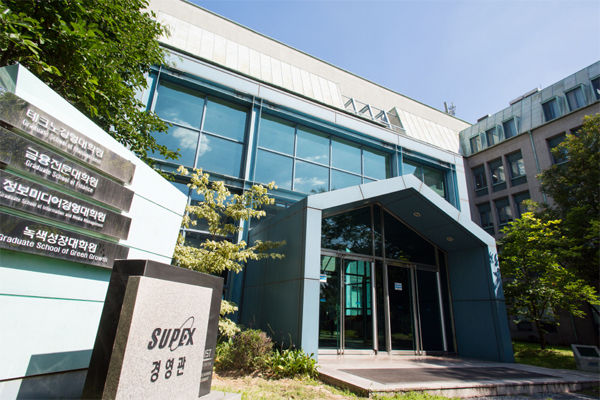KAIST MBA will more concentrate on data analysis and entrepreneurship2019-09-25Hit:1472
- 첨부파일
◆ Korea’s No. 1 MBA ◆

Since its establishment, KAIST College of Business (KCB) has aimed to foster multidisciplinary talent, with a deep understanding of both technology and management. In particular, the College has traditionally emphasized the importance of quantitative analysis. The objectives of KCB education are to train ‘business analytics’ experts to make prompt data-based business decisions and cultivate ‘entrepreneurship’ to drive innovation by seizing new business opportunities under rapidly changing circumstances.
Kim Young-bae, Dean of KAIST College of Business, said, “To lead the 4th Industrial Revolution, the College ensures that students can acquire both expertise and creativity by strengthening the curriculum focusing on business analytics and entrepreneurship.” From October 2 to 14, KCB is recruiting the 2020 MBA/Master students.
Introducing a business analytics curriculum that spans all programs, KAIST College of Business is prioritizing the importance of business education backed by data analysis. The curriculum aims to not only provide training in the basic technical skills required to become a Data Scientist, including data collection and management, but also to cultivate innovative business leaders capable of making effective decisions based on analytical results.
For beginners, KAIST College of Business provides Python and R programming courses starting with basic data analysis. Students develop the confidence to analyze real data in practice and apply the knowledge to their businesses through a number of case studies. Along with fundamentals to handle, refine, and analyze various types of data, the courses finally enable deeper understanding and practical application of Artificial Intelligence (AI) and Machine Learning. It is notable that even students with no technological background can master basic skills through systematic course design and field projects in a short period of time.
KAIST College of Business is also training entrepreneurs who can lead the second venture boom in startups or drive innovations and new business development at existing companies. In a rapidly changing business environment, the College defines its new vision: to nurture entrepreneurs in developing the skills to create and develop innovative business models by transforming customer demand and social issues into new business opportunities.
KCB has a long tradition in promoting entrepreneurship. While the College has steadily maintained entrepreneurship and venture-related courses since the early 1990s, In 2013 the Social Entrepreneurship MBA was set up in cooperation with the SK Group so that students can develop innovative solutions for social problems. Last year, in addition, Techno MBA renovated the curriculum and introduced new entrepreneurship courses.
The College is making further effort to encourage a startup culture inside the campus. Through cooperation with KAIST Daejeon Campus including Startup KAIST and K-School, students can register for joint lectures and participate in collaborative projects with other students in science and engineering. ‘KAIST Startup Platform’, Korea’s first online venture education platform, also provides a mentoring program and various information sources on startups.
△ Techno MBA, Korea’s first two-year full-time General MBA, has designated Business Analytics as a core requirement to cultivate talented individuals with the ability to understand both management and technology. The program aims to promote leaders to make decisions and establish strategies systematically.
△ With the recent emergence of the global Fintech market, Finance MBA aims to foster financial experts with a understanding of information technology and big data analysis. As a two-year full-time MBA, the program concentrates on Financial Programming and Financial Data Analysis to exercise financial basics in practice.
△ Professional MBA is for students who want to continue to work and, at the same time, upgrade their careers by taking evening classes. Based on the curriculum of the full-time Techno MBA, Professional MBA heavily concentrates on Marketing, Organization and Strategy, and Finance.
△ Information & Media MBA is a one-year full-time Specialized MBA for Business Analytics, IT Management, and Media Management. Information & Media MBA not only centers on general management training, but also focuses on courses in Data Mining, Statistics, and Quantitative Analysis to so that students have the practical skills to pursue convergence.
△ Executive MBA is a two-year weekend program taught on Fridays and Saturdays, designed for executive managers with a minimum of 10 years of work experience. The program aims to provide students with the strategic management foresight necessary to lead their organizations as creative CEOs.
△ Social Entrepreneurship MBA, initiated through the collaboration of SK Group and KCB, is Korea’s first two-year full-time MBA for social entrepreneurs. From ideation to successful establishment, the program provides tailored incubating support for managing sustainable social enterprises.
■ The Best Lecture of the Year / Professor Lee Eun-suk ‘Leadership and Organization Management’

What makes an organization successful? Regardless of industry type, most people agree that human capital has the greatest influence on how a business can survive and thrive. But even the most capable entrepreneurs often lack systematic thinking and insight in how to treat their employees.
Lee Eun-suk, an Associate Professor of Organization and Strategy at KAIST College of Business, teaches ‘Leadership and Organization Management’ to help students to understand the mentality and behavior of members in the organization. The course has its roots in the field of Organizational Behavior and ultimately aims to help students become rational decision-makers in industries.
Organizational Behavior is the study of both individual and group activity within an organization. In Professor Lee’s classroom, students not only learn traditional Organizational Behavior theories, but also have a chance to experience the latest studies and business cases.
Furthermore, students can promote entrepreneurship to effectively manage and lead their employees in the workplace.
While individual-level topics deal with the attitude, personality, motivation, and sentiment of employees, the course covers organizational-level theories as well, such as offitics, group dynamics, and organization culture.
But the course is not confined to simply delivering theoretical knowledge. Connecting theories to real-life experience, students systematically investigate the underlying psychological and sociological mechanisms behind phenomenon observed in the organization.
Students finally derive realistic and meaningful solutions by sharing and discussing their analysis with other colleagues. Afterwards, Professor Lee provides one-to-one feedback to help each student to look back on his/her behavior and become a leader prepared with an applicable theoretical framework.
In addition, students have a chance to lead the classroom after reading various related articles and forming a team. The team members have to manage an in-class discussion by not only analyzing the articles but also throwing a question based on the reports that other colleagues submit.
The presenters can experience the dynamics of a real organization, becoming a leader of the classroom.
Students are highly satisfied with Professor Lee’s teaching style. One student said, “It is a course where learning theoretical knowledge can bring ten practical harvests.”
■ Messages from a Graduate / Oh Sung-in

Q. Please tell us about yourself.
A. After completing my bachelor’s and master’s studies in the U.S., I worked three years at LG Electronics Research Center as a sensor development researcher and then enrolled in a TMBA program at KAIST in 2017. Currently, I am with LB Investment as a venture investment associate and managed investment & assessment.
Q. Why did you choose to get an MBA?
A. While I was concerned with my career, I read Peter Thiel’s “Zero to One” and decided to become a venture capitalist to comprehend the changing market environment and invest in innovative companies. Since I had no educational background in management, an MBA seemed like a great opportunity to attain knowledge of business administration and develop a powerful alumni network.
Q. And why did you choose KAIST College of Business?
A. Many KAIST MBA students have a background in science and engineering, and there have been plenty of successful career transfer cases due to the diverse curriculum and alumni network. KAIST College of Business has a rich exchange program and good academic infrastructure to promote students’ autonomous and creative thinking. I believe that KAIST MBA is a great platform for students to become global leaders with expertise in both management and technology.
Q. How did you change after participating in KAIST Techno MBA program?
A. I changed my way of thinking. Especially thanks to courses in Entrepreneurship and Marketing, I am now a creative thinker beyond theoretical frameworks. I can feel myself growing up through active discussions with professors and wide-ranging case studies.
Q. What was the most helpful curriculum do you remember?
A. TMBA Courses in Marketing, Ventures, and New Business Development have been a great help to broaden my horizons as a venture capitalist. I could also learn the European startup ecosystem through a student exchange program and met various people.